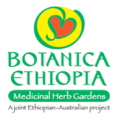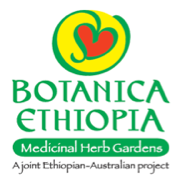Where better to begin a study of Ethiopia’s healing plants, than a city whose name means ‘New Flower’ – Addis Ababa.
Elizabeth d’Avigdor 16/1/2011
After a long flight, with a host of delays to do with visas and extra aid baggage, we stepped out of the sparkling airport in Addis at six in the morning and were very nearly knocked off our feet by a mad donkey, tearing at fast trot between the taxis along Bole road and headed goodness knows where… We’re in Africa!
And I’d forgotten how much there is to love about this place; even dusty, chaotic Addis Ababa.
Many things look as they did five years ago, though the recent investment and development in the city is obvious. Those construction sites with wonky tree-branch scaffolding now share parts of the road with rows of expensive looking houses and office buildings. There are new sealed roads, but still of course, the dusty grey bundles of rags and tarps by the side of them. Sadly, this is still how many live here.
After just a few days, I feel like I’ve been here for a long time. It’s familiar, I feel quite at home out and about, producing a lot of laughs with my feeble attempts at Amharic. I’ll always stand out as a Ferenji (foreigner) but I’m getting the hang of the language again and the Ethiopian ‘way of doing things’ – nothing much is organised ahead of time here; almost everything is done face-to-face.
But a bit like the manic traffic and the road rules (or seeming lack thereof), most things somehow just work and our first week has been a full and productive one.
First thing was to meet up with Lakew, our Project Coordinator here and owner of the land in Fiche, where we’ll be planting the herb garden. An Agronomist by trade, Lakew is passionate about promoting knowledge of his country’s natural heritage and herbal traditions. Meetings with Lakew are always animated and it’s exciting to finally be here sharing ideas with him.
Over Buna (coffee) we discussed the herbs that we’ll start trying to source for the garden. In preparation for planting, Lakew has arranged a delivery of good, nutrient-rich red soil to be mixed with the dense clay on the land. We’d managed to bring some irrigation equipment from Sydney which he told us would be especially useful in the dry season, when water can be pumped up from the bore.
Lakew spoke about his long term plans to have a portion of the land set aside as a park, with a clinic and coffee shop so that people can visit; sit and ask questions about the herbs, and in this way, learn about them and promote their use for good health. He hopes the community will be able to generate income from the garden one day by selling herbs and herb products at local markets, but his fervent wish is to see a herbal medicine patch of essential remedies in the yard of every home.
Next was a visit to the University of Addis Ababa to meet Dr. Zemede Asfaw, who will be assisting me with the research side of the project. The Uni grounds and buildings used to be the palace of the former Emperor Haille Sellassie; donated by him in 1962 and transformed as the main campus. It is one of the oldest and largest learning institutions in Africa.
Dr. Asfaw gave me a tour of the campus and the Herbarium, introducing me to a few people, one of whose name I recognized from studies I used in my literature review. We found some great reference books in the library; eight volumes of The Flora of Ethiopia and Eritrea and another text in Amharic which Lakew is especially excited about as it was written by a well-known healer who was seconded to the uni for some years to write down everything he knew.
Dr Asfaw is also trying to source a Research Assistant for me; this is especially important as I need someone who is knowledgeable enough in Ethiopian botany to make voucher specimens of the plants, which will be logged at the Herbarium later on.
Besides this, the days have been busy catching up with people, finding our way through the city, the vegetable markets, cafes and internet shops. Alemayehu and Bizunesh (Alemayehu’s older sister who arrived in Australia three years ago) are both so happy to be back here; visiting friends and relatives, enjoying real injera pancakes and berbere spices, and everything else Ethiopian.
Next week, after the colourful Timket Epiphany celebrations, we travel to Fiche. But before then, Lakew tells me he has an old herbalist friend outside of Addis, who is willing to talk with me if we can make a visit in the next few days. This is unusual; there is a lot of secrecy around herbal medicine practice and a general (and understandable) reluctance for this knowledge to be passed on – particularly to strangers. So I’m thrilled and honoured if he is, indeed, happy to speak with me about his work.







Pingback: iEthiopia: RT @BotanicEthiopia: Where better to begin a study of Ethiopia’s healing plants, than a city whose name means ‘New Flower’ – Addis Ababa … | iEthiopia
Really great to hear what you’re doing. Will be following with interest.
All the very best for a wonderful journey.
Jackie Rees (ex Blackmores)